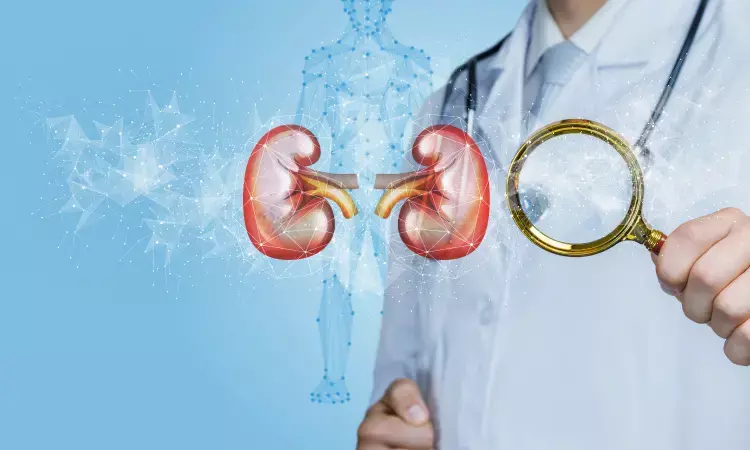- Home
- Medical news & Guidelines
- Anesthesiology
- Cardiology and CTVS
- Critical Care
- Dentistry
- Dermatology
- Diabetes and Endocrinology
- ENT
- Gastroenterology
- Medicine
- Nephrology
- Neurology
- Obstretics-Gynaecology
- Oncology
- Ophthalmology
- Orthopaedics
- Pediatrics-Neonatology
- Psychiatry
- Pulmonology
- Radiology
- Surgery
- Urology
- Laboratory Medicine
- Diet
- Nursing
- Paramedical
- Physiotherapy
- Health news
- Fact Check
- Bone Health Fact Check
- Brain Health Fact Check
- Cancer Related Fact Check
- Child Care Fact Check
- Dental and oral health fact check
- Diabetes and metabolic health fact check
- Diet and Nutrition Fact Check
- Eye and ENT Care Fact Check
- Fitness fact check
- Gut health fact check
- Heart health fact check
- Kidney health fact check
- Medical education fact check
- Men's health fact check
- Respiratory fact check
- Skin and hair care fact check
- Vaccine and Immunization fact check
- Women's health fact check
- AYUSH
- State News
- Andaman and Nicobar Islands
- Andhra Pradesh
- Arunachal Pradesh
- Assam
- Bihar
- Chandigarh
- Chattisgarh
- Dadra and Nagar Haveli
- Daman and Diu
- Delhi
- Goa
- Gujarat
- Haryana
- Himachal Pradesh
- Jammu & Kashmir
- Jharkhand
- Karnataka
- Kerala
- Ladakh
- Lakshadweep
- Madhya Pradesh
- Maharashtra
- Manipur
- Meghalaya
- Mizoram
- Nagaland
- Odisha
- Puducherry
- Punjab
- Rajasthan
- Sikkim
- Tamil Nadu
- Telangana
- Tripura
- Uttar Pradesh
- Uttrakhand
- West Bengal
- Medical Education
- Industry
LRG1 predicts kidney disease progression in type 2 diabetes patients

Singapore: Diabetes is the leading cause of end-stage kidney disease (ESKD) in many countries (1). The pathophysiological mechanisms underlying the pathogenesis and progression of diabetic kidney disease (DKD) are only partially understood.
According to research published in the Diabetes care Journal, Urine leucine-rich-alpha-2 glycoprotein 1 (LRG1) is a novel protein involved in the pathophysiology of progressive kidney disease with type 2 diabetes (T2D).
The team of researchers studied the association between LRG1 levels and end-stage kidney disease (ESKD).
In animal models, LRG1 is identified as an amplifier of transforming growth factor-β (TGF-β)–induced kidney fibrosis.
The researcher's team, led by Jian-Jun Liu from the Khoo Teck Puat Hospital studied the role of LRG1 in type 2 diabetes individuals regarding its association with the risk of progression to end-stage kidney disease (ESKD).
The study summary is as follows:
- There were 1,837 participants with type 2 diabetes and eGFR >30 mL/min/1.73 m2.
- Urine LRG1 measurement at baseline (cohort enrolment).
- Survival analysis to study the association of urine LRG1 with the risk of ESKD.
- The duration of the mean follow-up was 8.6 years.
- 134 ESKD events were identified (sustained eGFR < 15 ml/min/1.73 m2, dialysis or renal death.
- The study participants with urine LRG1 in the highest tertile had a significantly higher risk for ESKD progression.
- One SD increment was associated with a 1.53-fold adjusted risk of ESKD.
- Urine LRG1 was associated with a rapid decline in kidney function (eGFR decline 5ml/min/1.73 m2 per year or greater) and risk for progression to macroalbuminuria.
To conclude, Urine LRG1 predicts the risk of ESKD progression independently of clinical risk factors in T2D patients. This is a valuable marker to indicate the progression to ESKD.
The participants in the highest tertile of urine LRG1 levels had a significantly higher risk for incident ESKD.
Citation
Jian-Jun Liu et al. Urine Leucine-Rich α-2 Glycoprotein 1 (LRG1) Predicts the Risk of Progression to End-Stage Kidney Disease in Patients With Type 2 Diabetes. Diabetes Care 2022; dc221611. https://doi.org/10.2337/dc22-1611
Dr Kartikeya Kohli is an Internal Medicine Consultant at Sitaram Bhartia Hospital in Delhi with super speciality training in Nephrology. He has worked with various eminent hospitals like Indraprastha Apollo Hospital, Sir Gangaram Hospital. He holds an MBBS from Kasturba Medical College Manipal, DNB Internal Medicine, Post Graduate Diploma in Clinical Research and Business Development, Fellow DNB Nephrology, MRCP and ECFMG Certification. He has been closely associated with India Medical Association South Delhi Branch and Delhi Medical Association and has been organising continuing medical education programs on their behalf from time to time. Further he has been contributing medical articles for their newsletters as well. He is also associated with electronic media and TV for conduction and presentation of health programs. He has been associated with Medical Dialogues for last 3 years and contributing articles on regular basis.
Dr Kamal Kant Kohli-MBBS, DTCD- a chest specialist with more than 30 years of practice and a flair for writing clinical articles, Dr Kamal Kant Kohli joined Medical Dialogues as a Chief Editor of Medical News. Besides writing articles, as an editor, he proofreads and verifies all the medical content published on Medical Dialogues including those coming from journals, studies,medical conferences,guidelines etc. Email: drkohli@medicaldialogues.in. Contact no. 011-43720751


